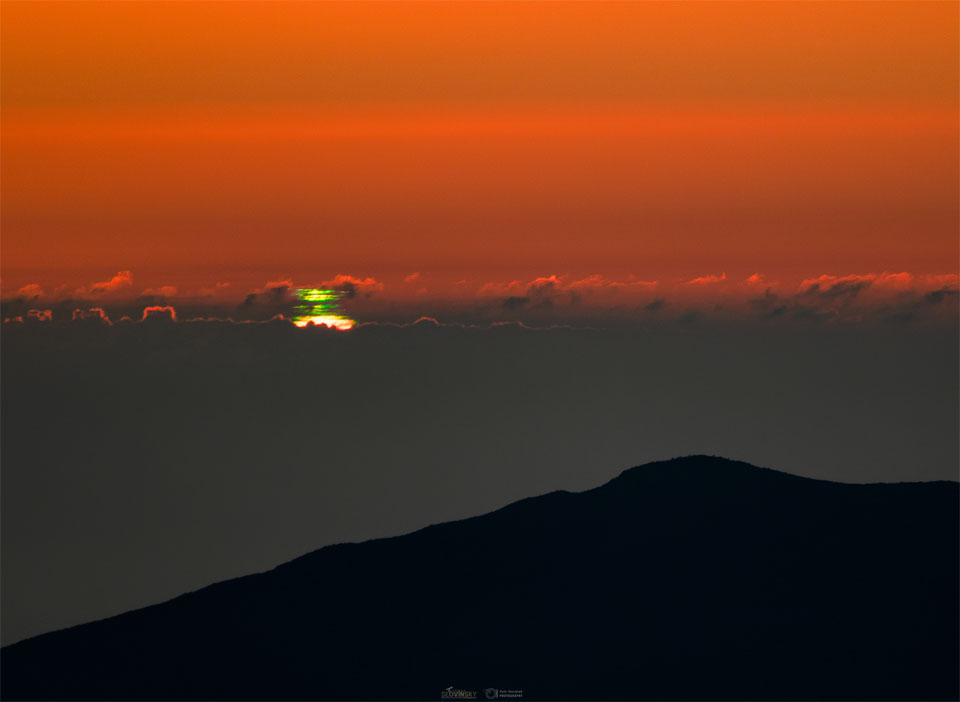Page 1 of 1
APOD: A Multiple Green Flash Sunset (2023 Mar 28)
Posted: Tue Mar 28, 2023 4:05 am
by APOD Robot
 A Multiple Green Flash Sunset
Explanation:
A Multiple Green Flash Sunset
Explanation: Yes, but can your green flash do this? A
green flash at sunset is a rare event that many Sun watchers pride themselves on having seen. Once thought to be a
myth, a
green flash is now understood to occur when the Earth's atmosphere acts like both a
prism and a lens. Different
atmospheric layers create altitude-variable
refraction that takes light from the
top of the Sun and disperses its colors, creates two images, and magnifies it in just the right way to make a
thin sliver appear green just before it disappears.
Pictured, though, is an even more unusual sunset. From the high-altitude
Cerro Tololo Inter-American Observatory in
Chile one day last April, the Sun was captured setting beyond an atmosphere with
multiple distinct thermal layers, creating several mock images of the
Sun. This time and from this location, many of those layers produced a
green flash simultaneously. Just seconds after this multiple-green-flash event was caught by
two well-surprised astrophotographers, the Sun set below the clouds.
Re: APOD: A Multiple Green Flash Sunset (2023 Mar 28)
Posted: Tue Mar 28, 2023 5:28 am
by Ann
Nice APOD!

However, me being me, I can't resist showing you this:
So some sunsets come not only with flashes of
green, but on rare occasions, even with flashes of
blue!!! 
Ann
Re: APOD: A Multiple Green Flash Sunset (2023 Mar 28)
Posted: Tue Mar 28, 2023 7:17 am
by madtom1999
Saw a green flash only once so far. The thing both I and my partner remember was the flash appeared to be across the sky, not just over the sunset. I do wonder if it was the green light being reflected around the inside of the eye but even so the flash was a flash. Not as in the pictures but a lot more intense - as if someone had fired a green camera flash at you.
Re: APOD: A Multiple Green Flash Sunset (2023 Mar 28)
Posted: Tue Mar 28, 2023 12:15 pm
by VictorBorun
I am not satisfied with explanation of green flash either by wiki or this APOD.
1) Why do we normally not see aqua (green to cyan), or lime (green to yellow), or purple (pink to violet), or magenta (pink to red)? Why do we normally see just orange (red to yellow) or blue (violet to cyan)?
2) Why do we get to see a green flash (actually lime) sometimes?
I believe that
1) Generally, a separation process produces, at larger or smaller angles from the source of white light, either light depleted of red and, somewhat, of green (the result is blue), or light depleted of violet and, somewhat, of green (the result is orange). This includes the rims of Sun's disk seen through thick air low at horizon
2) if somehow you get the light go through two opposite filters one after another and get finally depleted both ways, then you should see aqua or lime
Re: APOD: A Multiple Green Flash Sunset (2023 Mar 28)
Posted: Tue Mar 28, 2023 1:30 pm
by orin stepanek
Ah; so pretty! Amazing that that happens when the conditions are
right!

Re: APOD: A Multiple Green Flash Sunset (2023 Mar 28)
Posted: Tue Mar 28, 2023 3:42 pm
by De58te
It is amazing that happens when conditions are right. I suppose it would be EVEN more amazing, even astounding if the green flash happens when conditions are wrong.
Re: APOD: A Multiple Green Flash Sunset (2023 Mar 28)
Posted: Tue Mar 28, 2023 7:59 pm
by johnnydeep
All right, I give up: where are the supposed "mock" images of the sun in this image?
Re: APOD: A Multiple Green Flash Sunset (2023 Mar 28)
Posted: Wed Mar 29, 2023 1:22 am
by hypermetabolic
During my year in Thule, Greenland, only 10 degrees from the North Pole, at the end of the 24 hour sunlight season the setting sun would graze the horizon before rising again. I could change the sun's apparent altitude by walking up and down a north-facing hill. The polar air was very clear, so I could change the apparent colour from almost white throughout the spectrum to an almost violet. The intensity was doubled by the sun's reflection from the reflection by the mirage created by the warmer air over the sea ice, similar to the mirage seen over hot pavement in temperate climes.
 A Multiple Green Flash Sunset
A Multiple Green Flash Sunset
